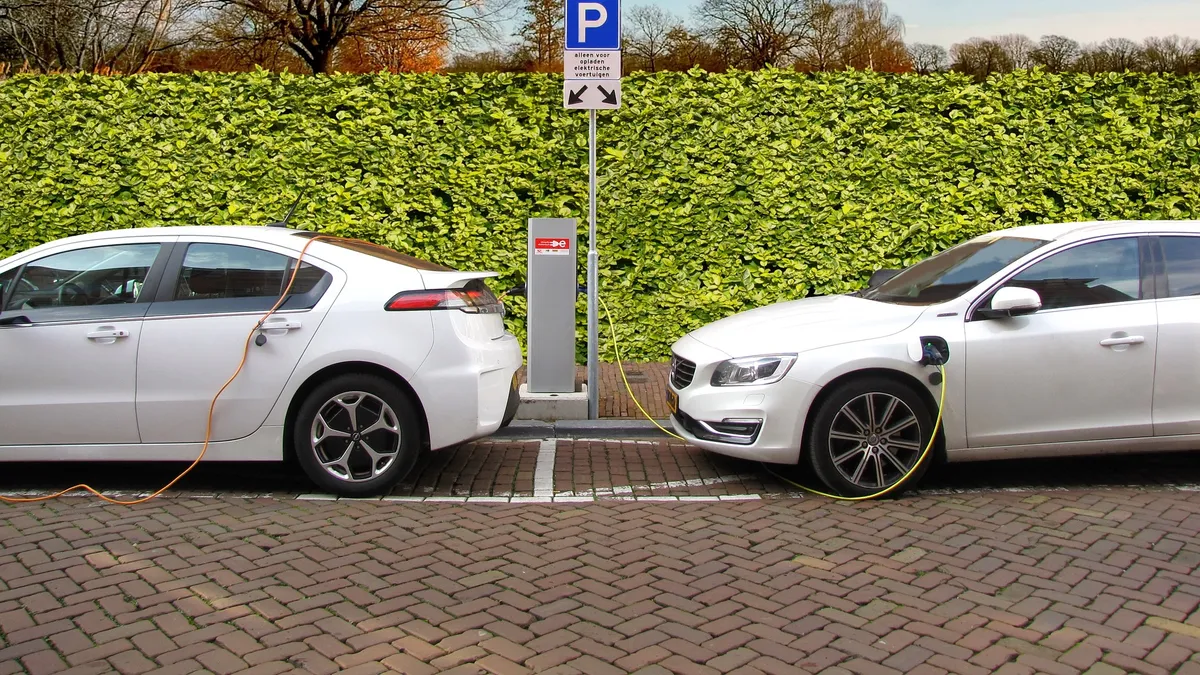Dive Brief:
- The U.S. Department of Energy is planning to launch new public-private partnerships similar to its Energy Storage Grand Challenge in an effort to drive down battery costs and ultimately decarbonize the transportation sector, Michael Berube, deputy assistant secretary for sustainable transportation in DOE's Office of Energy Efficiency and Renewable Energy, said Thursday at a webinar hosted by Third Way.
- Berube said the new partnerships will focus on linking raw materials processing with supply chains and cell manufacturing, aiming to reduce battery costs from more than $120/kWh today to $60/kWh by 2030. At that level electric vehicles would be near cost parity with internal combustion engine vehicles, he said, possibly allowing the government to take more aggressive steps to eliminate carbon emissions in the sector.
- Automakers were also at the Third Way event, and expressed optimism for the future of energy storage and clean transportation in the near term. "We think there are efficiencies to be rung out of the supply chain," said Michael Maten, General Motor's senior EV and energy policy strategist.
Dive Insight:
More efficient, cheaper and sustainable batteries must be developed in order to rapidly accelerate the adoption of electric vehicles, experts agree. And despite challenges in achieving those goals, there appears to be consensus between automakers and government officials that it is possible — but will require intensive coordination and investment.
President Joe Biden has set out a goal for half of all new U.S. passenger vehicle sales to be electric vehicles by 2030. "It is ambitious and we need to go beyond that. But if we can get to 50% by 2030, we can do more," Berube said.
Reaching 50% new EV sales will require progress on three main fronts, he said, including battery costs, building out charging infrastructure and developing domestic supply chains.
"We need to continue driving battery costs down," Berube said. "We've had tremendous progress, but we need to continue that effort."
Those efforts will include development of new battery technologies and chemistries, advanced manufacturing approaches, and then scaling up those systems. "We need to do it cooperatively, with industry," said Berube, pointing to DOE's Energy Storage Grand Challenge as an example of successful collaboration.
The challenge is part of DOE's effort to push battery technology forward, for both grid-scale and electric vehicles. "We can't decarbonize transportation without first achieving our goal of a 100% clean grid," Berube said.
In June, DOE announced $200 million in funding over a 5-year period for EV batteries and related projects at the agency's national laboratories. Then in July, it rolled out $60 million for two dozen research and development projects aimed at decarbonizing passenger vehicles, including efforts to design lithium batteries with longer lifespans and cheaper prices, and improve vehicle design. And Berube said there is more to come.
"We will be developing a new public-private partnership around batteries in anticipation of the significant amount of dollars both the federal government will be spending, but also that the private sector needs to be spending, and the fact that we need to link the processing side up front with the supply chain, with the cell manufacturing, to bring all these pieces together," Berube said.
According to the Electric Power Research Institute, the current cost per kWh for EV batteries is between $120/kWh and $200/kWh at the battery pack level, which includes an integrated battery management system and thermal management.
Berube said that if battery costs can drop to $60/kWh, that will put EVs near price-parity with internal combustion engines, but "without that, you can't mandate it, if the economics aren't there," he said, discussing vehicle sales and the transition to a carbon-free transportation sector.
Along with new battery chemistries that could shift to more sustainable raw materials, Berube also said battery recycling will play a key role. DOE believes roughly 30% to 40% of raw materials for future batteries can come from recycled storage, he said. Lithium-ion is now the dominant battery technology on the grid and in EVs, but "that may change over time," he added.
GM's Maten was optimistic for the next generation of batteries, and agreed that more can be done in the near-term with existing structures. "The zero emission future is an inevitability," he said. "We can bring some of our rigor and efficiency to supply chains," as the automaker scales up its embrace of electric vehicles.
GM plans to to offer 30 new EV models for sale by 2025, and other automakers are following suit.
Lower cobalt chemistries with higher energy densities will be a part of that, as well as "designing EVs around the battery from the ground up." But Maten added that purchase incentives are still needed, and there must be extensive investment in charging infrastructure to alleviate range anxiety.
"We know customers won't compromise on range to get to lower cost," said Maten. That makes public-private partnerships all the more vital, to accelerate decarbonization.
"There is a lot of room for the government to play," he said, and everything coming out of Washington right now is "heading in the right direction."
Vehicle charging infrastructure got a boost on Wednesday, with the announcement of a new coalition of two dozen groups representing automakers, workers, utilities, suppliers and others, that will lobby for development of a nationwide network. The National EV Charging Initiative says it will push for deeper commitments from its members and the federal government "to deploy the charging stations needed to improve air quality, create domestic jobs, address racial inequities and curb climate change."
Groups signed on to the effort include Natural Resources Defense Council, National Association of State Energy Officials, Plug In America, Sierra Club and the Zero Emission Transportation Association.
"Only with the private investments complementing the public support will we realize our goals," Nancy Ryan, a partner at eMobility Advisors and one organizer of the initiative, said in a statement. "Neither one can do it alone, but together we can create the future we want and need."















